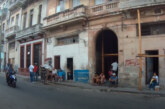
CLEVELAND (June 24, 2021) – The Cleveland Foundation Board of Directors today announced $40.4 million in grants approved in the second quarter of 2021. Supporting residents in Cuyahoga, Lake and Geauga counties, the foundation and its donors have invested nearly $65.2 million in the community year-to-date, including nearly $13.6 million from donor advised funds in the first half of 2021. Highlights of grants approved this quarter by the foundation’s board of directors include:
Arts & Culture
- Cleveland Public Theatre, Inc. (CPT) ($200,000) – Like many arts organizations around the country, CPT was hit hard by the COVID-19 pandemic. As it celebrates its 40th anniversary, CPT will use this support to produce a full season of plays – including a full lineup of outdoor, in-person performances – designed to raise consciousness and nurture compassion, while also conducting cultural engagement programming and neighborhood events.
- The Sculpture Center ($25,000) – Much of the histories of East Cleveland and Cleveland’s near east side neighborhoods have been forgotten or overwritten, which has been detrimental to racial harmony in the community. This grant will support the organization’s Crossroads program, a triennial exhibition of public art viewed in augmented reality (AR), and its new exhibition “Still We Rise,” featuring 12 local Black, Indigenous and people of color (BIPOC) artists who will create AR public art that explores this history.
Education
- College Now Greater Cleveland, Inc. ($250,000) – College tuition costs – though a major barrier – are not the only challenge for many students. Social-emotional and academic supports also play a significant role in scholars’ success, in addition to financial support for non-tuition costs of attendance. The Say Yes Scholars Program at Cuyahoga Community College is a cohort-based initiative at Tri-C to provide Say Yes-eligible CMSD graduates with targeted success coaching and guidance for navigating the various aspects of college life. It offers a vehicle for students to become part of the Say Yes effort, benefit from the College Now mentoring program, and receive much-needed incentive grants. These components have already led to a dramatic rise in persistence in just two short years – even despite the pandemic – and students feeling a greater sense of community and being more involved in events and activities. The Cleveland Foundation continues to partner with The George Gund Foundation, Say Yes Cleveland, College Now, and the Tri-C Foundation to support the Tri-C Say Yes Scholars Program in the third year of the effort.
Environment
- Alliance for Climate Education (ACE) ($200,000) – According to 2019 data prepared by the Rhodium Group, Ohio is the third highest emitter of CO2 emissions, behind California and Texas. Studies have shown that higher levels of CO2 emissions have a greater impact on communities of color. This grant will allow ACE to hire a Cleveland-based Civic Engagement Organizer to cultivate and deepen partnerships with local organizations and with the Cleveland Metropolitan School District as well as collaborate with other statewide and local civic engagement partners to mobilize youth activism around climate issues.
- United States Energy Foundation ($1,000,000) – As the third highest CO2 emitter in the country, Ohio matters to the national and global climate equation. This funding will help scale the Power a Clean Future Ohio (PCFO) and Ohio Climate Justice Fund (OCJF) initiatives launched last year. The goal of PCFO is to reduce carbon emissions equitably by 30% by 2030, and a new regional director will be charged with cities’ engagement in Greater Cleveland, with particular attention to providing outreach, technical assistance, and planning support to majority Black, Indigenous and people of color (BIPOC) and BIPOC-led cities most poised to benefit from the clean energy transition. The “Listen. Lead. Share.” program from OCJF provides small grant resources and trains local groups to host a community meeting to envision what they want their clean energy future to look like.
Leadership
- Cleveland Leadership Center ($100,000) – The Legacy Leaders program fills a key need within the Encore network to more fully engage seasoned leaders who are retired, approaching retirement, or transitioning in their careers, affording them the chance to find meaningful opportunities to contribute – or continue contributing – to the community. This grant will allow for the continued growth of the three-pronged initiative: 1) Cleveland Forward – an ongoing series of education conversations, a strategic planning and roadmap project with Cleveland Cultural Gardens, and building an advocacy network for leaders of color; 2) Puerto Rico Service – a mission trip that will help build stronger connections between the island and Cleveland’s Puerto Rican community; and 3) Social Entrepreneurism – conducting the annual “Accelerate: Citizens Make Change” civic pitch competition for individuals with innovative ideas for social change.
Neighborhood Revitalization & Engagement
- Cleveland Restoration Society, Inc. ($165,000) – The need to address Cleveland’s affordable housing crisis continues to loom large as poverty, housing stock built before 1940, redlining, and other measures have all converged and resulted in today’s housing conditions in Hough. This new initiative will allow for the preservation and maintenance of architecturally significant houses in a historic district and highlight the cultural heritage of Newton Avenue and its residents. Additionally, the project provides naturally occurring affordable housing to current, long-term tenants, who will pay rents that are significantly lower than fair-market rents and lower even than affordable housing rents in adjacent buildings.
- HOLA Ohio ($10,000) – The pending demolition of Club Azteca, an iconic building in Cleveland, has brought to light the lack of awareness of more than 100 years of Mexican immigrant presence and contributions that form part of Cleveland’s diverse fabric. Through this project, HOLA will work in partnership with the Western Reserve Historical Society and other entities to tell the complex story of Mexican history in Cleveland, and to assist with formulating a plan that will proactively preserve this history for future generations.
Youth, Health & Human Services
- Asian Services in Action, Inc. (ASIA) ($100,000) – The COVID-19 pandemic has exacerbated the Asian American/Pacific Islander (AAPI) community’s already tenuous access to quality culturally and linguistically appropriate information, health and social services. This funding will allow the organization to build capacity for its International Community Health Center (ICHC) with a twofold approach to telehealth: the implementation of a telehealth pilot program for 25 high-risk patients as well as in-clinic telehealth-like practices with reduced risk of COVID-19 transmission between patients, staff, and providers while also responding to patient preferences for in-person healthcare.
- B. Riley Sober House ($45,675) – Data from the National Survey on Drug Use and Health suggest that LGBTQ+ individuals are two times as likely to abuse drugs or alcohol than their heterosexual peers, with finding and maintaining employment among the biggest challenges to maintaining sobriety. This grant will allow the organization to introduce career readiness training by engaging a certified career development facilitator to lead a month-long career readiness program for LGBTQ+ individuals that includes, but is not limited to, interpersonal and problem-solving skills, basic computer literacy, and financial literacy.
- Cleveland Rape Crisis Center ($200,000) – According to the Rape, Abuse, and Incest National Network, an American is sexually assaulted every 73 seconds. More than 50% of sexual assault victims are individuals ages 12-34, and the majority of sexual assault victims are women, with one in six women experiencing an attempted or completed sexual assault in their lifetime. Recent research published in The New England Journal of Medicine has described sexual violence during COVID-19 as “a pandemic within a pandemic.” This grant will allow the organization to continue strengthening its presence in the Shaker Square and Clark-Fulton communities while building capacity for outreach and community engagement efforts.
- Enterprise Community Partners, Inc. ($175,000) – Homelessness and housing instability have profound negative impacts on health and well-being, as individuals experiencing homelessness are more likely to experience chronic disease and additional poor health outcomes. This grant will allow the organization to address homelessness and housing instability in partnership with key local entities, including the Lead Safe Cleveland Coalition, Cleveland’s network of community development corporations, and others.
- Lake County Free Clinic ($650,000) – After being displaced from its previous location, the Lake County Free Clinic will now be able to relocate to a permanent home. In addition to permitting the organization to streamline its operations, this funding will also support increased dental services while introducing new lines of services in women’s health and case management.
- Welcome House, Inc. ($195,000) – The Developmental Disabilities Provider Consortium (DDPC) of Cuyahoga County was formed in 1994 for providers of persons with intellectual and developmental disabilities (IDD). However, all IDD service providers in Cuyahoga County now face a staffing crisis, with the collective annual average staff turnover rate at approximately 45-60%. This grant will allow the DDPC to learn over the next two years if an Employer Resource Network driven by success coaches can work with staff on a personalized basis to lower staff turnover.
1755 Total Views 1 Views Today
Comments
Powered by Facebook Comments



